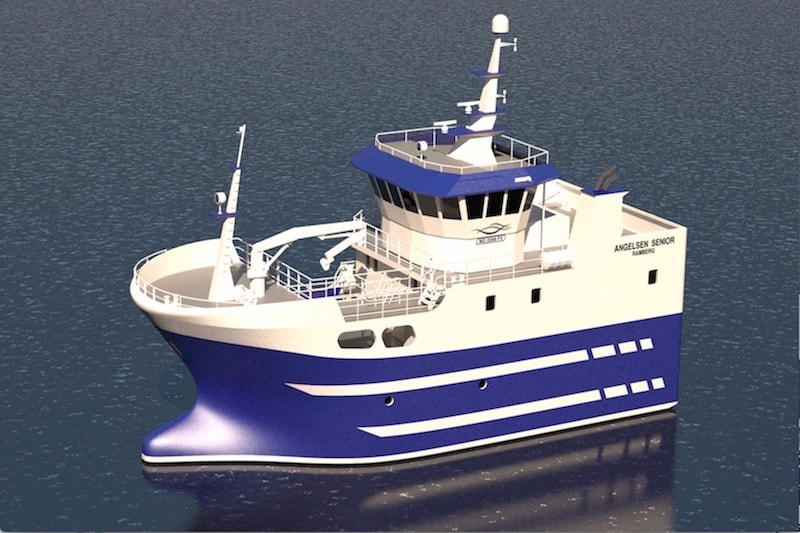The Moen Marin yard is to build a new fishing vessel for Lofoten fishing company Hans Angelsen og Sønner. The 21m Marin Design BN200 is expected to be the largest fishing vessel to date to rely on battery power, backed up by a pair of diesel gensets.
The diesel-electric battery configuration is expected to cut fuel consumption compared to conventional propulsion by around 25% and to reduce CO2 emissions by 200 tonnes annually.
‘Co-operation with the owners has been an important prerequisite for the development of the diesel-electric battery hybrid. They are motivated to think innovatively and to work towards operating in an environmentally friendly manner as well as and reducing operating costs,’ said Torfinn Hansvik, technical manager at Moen Marin.
According to Torfinn Hansvik, netting as a fishing method has great potential for using battery power because diesel engines have poor efficiency at low speeds. The vessel can reduce the operating time of the diesel engines by 75%.
The 20.99m LOA by 9m beam netter will have an Elmarin hybrid battery propulsion system powering a pair of 325kW motors to drive a Helseth propeller. The side thruster is a 250hp MBH unit. The system is coupled to twin Scania DI 13 generators and the Corvus 270kWh battery can be also charged via a shore connection when the vessel is docked
It will also have a Latech AS processing deck, a 150 cubic metre fishroom and accommodation for a crew of up to eight. The deck is to be fitted out with Triplex KN 10 and TMP 900 cranes.
‘The boat is going to be operating under conditions in which the diesel engine has the lowest efficiency, such as hauling nets. The generators are capable of charging the batteries, allowing the boat to run on clean battery power for some hours,’ he explained.
Enova has contributed NOK 2.7 million to the development of the new battery hybrid, which is expected to cutt the vessel’s annual CO2 emissions by 200 tonnes.
‘We want to contribute to the development and application of new technology that reduces greenhouse gas emissions at sea. By delivering this boat to meet expectations, we believe many others will follow,’ said Ole Aksel Sivertsen, Marketing Manager at Enova.
He believes this Moen Marin BN 200 will be an important vessel, as it has the potential to introduce electrical propulsion to new sectors of the fishing industry.
‘Fishing vessels have greater limitations related to space on board and equipment weight. The fact that these systems are now good enough to be used by fishermen also demonstrates that the battery revolution at sea is continuing,’ he said.
There has been a strong focus on reducing overall energy consumption during the design process of the new vessel. Excess heat from the cooling systems is routed to the vessel’s internal heating systems. There is also a focus on electrical equipment, such as the MBH thrusters and the electric haulers.
Elmarin is providing the complete battery hybrid propulsion system including switchboards, frequency converter battery packs and the manoeuvering and control systems.
For the operator, there are benefits in terms of lower greenhouse gas emissions and reduced fuel costs.
‘Reducing noise levels on board has also been a motivating factor. The boat will go be able to run on its battery power while fishing, handling the catch and laying to. This we believe this will be outstandingly good,’ said owner Øystein Angelsen.





